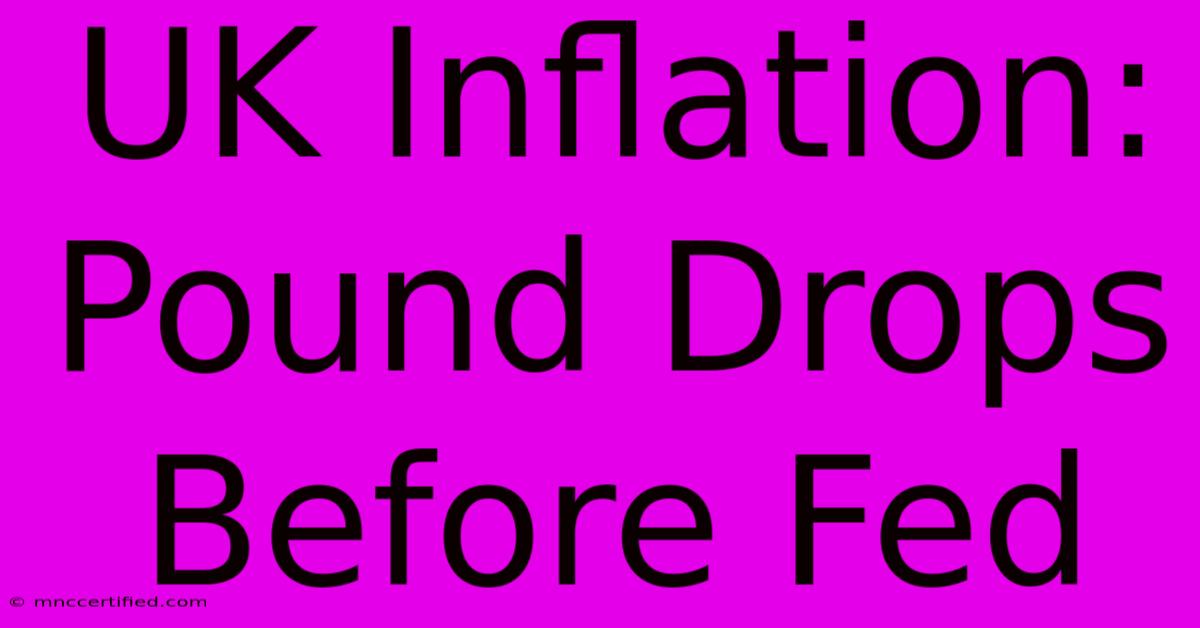UK Inflation: Pound Drops Before Fed

Table of Contents
UK Inflation: Pound Drops Before Fed Decision
The UK pound experienced a significant drop against the US dollar in anticipation of the Federal Reserve's (Fed) interest rate decision. This decline comes amidst already high inflation figures in the UK, creating a complex economic scenario with significant implications for British consumers and businesses. Let's delve into the factors driving this downward pressure on the pound and explore the potential consequences.
Soaring Inflation: A Key Driver
The UK's stubbornly high inflation rate is a major contributing factor to the pound's weakness. Recent figures showed inflation remaining stubbornly above the Bank of England's target, fueling concerns about the cost of living crisis and the effectiveness of monetary policy. High inflation erodes purchasing power, making UK exports relatively more expensive and imports cheaper, impacting the trade balance and putting downward pressure on the currency. This situation is further exacerbated by the ongoing energy crisis and supply chain disruptions.
The Bank of England's Response
The Bank of England (BoE) has been actively trying to combat inflation through interest rate hikes. However, the effectiveness of these measures remains a subject of debate. While raising interest rates can help curb inflation by reducing borrowing and spending, it also risks slowing economic growth and potentially triggering a recession. This delicate balancing act is a major challenge for the BoE, and uncertainty surrounding its future policy decisions contributes to the pound's volatility.
The Fed's Influence: A Global Impact
The anticipated Fed rate decision plays a crucial role in the pound's performance. A more hawkish stance from the Fed – meaning further interest rate increases – typically strengthens the US dollar, making other currencies, including the pound, relatively weaker. Investors often move their capital towards assets offering higher returns, leading to increased demand for the dollar and consequently a decrease in the value of the pound. The anticipation of this decision, therefore, is a key factor contributing to the current downward pressure.
Investor Sentiment and Market Volatility
The current economic climate is characterized by significant uncertainty and volatility. Investor sentiment plays a crucial role in shaping currency exchange rates. Concerns about global economic growth, geopolitical instability, and the ongoing impact of the war in Ukraine all contribute to market nervousness and can trigger capital flight away from riskier assets, like the pound. This further exacerbates the downward pressure on the currency.
Long-Term Implications for the UK
The weakening pound has several potential implications for the UK economy. Increased import costs could further fuel inflation, impacting consumers already grappling with the cost of living crisis. For businesses, it could lead to higher input costs and reduced competitiveness in global markets. However, a weaker pound can also make UK exports more attractive, potentially boosting certain sectors of the economy. The net effect will depend on a complex interplay of factors and the overall trajectory of the global economy.
Navigating Uncertainty
The current economic situation presents a considerable challenge for policymakers and businesses alike. Effectively managing inflation while avoiding a significant economic slowdown is a paramount concern. Careful monitoring of economic indicators, strategic policy decisions, and proactive adaptation by businesses will be crucial in navigating this period of uncertainty. The interplay between UK inflation, the Fed's decisions, and investor sentiment will continue to shape the value of the pound in the coming months. Further analysis and careful observation will be needed to fully understand the long-term consequences of the current economic landscape.
Keywords: UK inflation, pound sterling, US dollar, Federal Reserve, Bank of England, interest rates, cost of living crisis, economic growth, investor sentiment, market volatility, currency exchange rates, global economy, trade balance.

Thank you for visiting our website wich cover about UK Inflation: Pound Drops Before Fed. We hope the information provided has been useful to you. Feel free to contact us if you have any questions or need further assistance. See you next time and dont miss to bookmark.
Featured Posts
-
Bbc Sports Personality 2024 Time Presenters Odds
Dec 18, 2024
-
Sam Fender Postpones Glasgow Newcastle Gigs
Dec 18, 2024
-
Meet Keely Hodgkinsons Coaches
Dec 18, 2024
-
Cavendishs Spoty Award A Competitors Perspective
Dec 18, 2024
-
Connolly Tops Aoc In Oversight Race
Dec 18, 2024